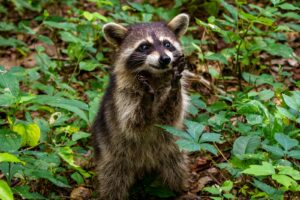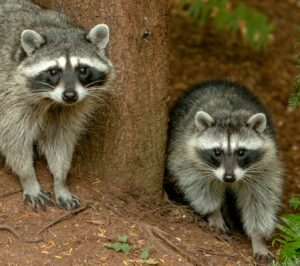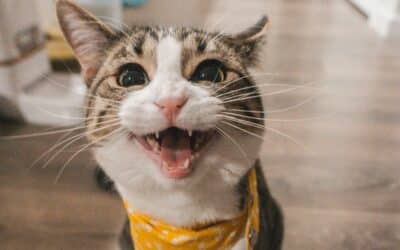Can raccoons be pets? Yes, with extra time and care. Keep reading!
Picture it: a curious, masked face peeks from behind your curtains, not foraging through your bins, but to cuddle up by your toes as you binge-watch your favorite series.
The idea of keeping a raccoon as a pet might awake your inner child, full of whimsy and daydreams, yet the reality is far more complex than the cuteness might suggest. In this in-depth exploration, we’ll uncover the wild reality behind the question: Can raccoons be pets?
Understanding the Law: Your First Raccoon Roadblock
Before you ever entertain the notion of ownership, it’s crucial to grasp the legal wrangle of housing a raccoon. The very first hurdle you will face isn’t acquiring wild animal permit for a raccoon, but the question of ‘Can you?’
With animals such as raccoons, which are classified as ‘rabies vector species,’ the answer usually falls on the side of ‘No.’
In the United States, each state has its own set of regulations—protecting both humans and wildlife—that dictate whether raccoons can be domesticated into pet racoons.
The Mask Slips: The Fine Print of Raccoon Ownership
Understand the concept of prohibition or severe restrictions. Raccoons are often carriers of rabies, making them a public health concern.
For prospective pet raccoon owners, navigating these legal labyrinths involves a spotlight on the backroom dealings of exotic pet trading, where stories seldom end well for the raccoons or their human counterparts.

Can Raccoons Be Pets? Raccoon Behavior and Care
If permitted, a domestic raccoon could live up to 16 years in captivity, which is a significant commitment.
Raccoons are highly- intelligent animals, with dexterous paws capable of prising open more than just our garbage. But, do we really understand the needs of these masked marvels?
Living Large: Home and Shelter for Raccoons
A raccoon-proof enclosure might ‘temporarily’ house your pet raccoon raccoons.
After all, their climbing prowess and keen problem-solving nature often end in escape attempts and triumphs—our rubbish bin being a close analogy to a Fort Knox-level puzzle for them.
You Are What You Eats: Diet of a Raccoon
Thinking of a raccoon’s diet might conjure images of binside buffet, yet their nutritional needs go beyond street snacks.
A raccoons eat a diet rich in variety reflects their omnivorous nature; they will thrive on a platter of fruits, vegetables, nuts, and protein sources like eggs.
The Wide-Eyed: Raccoon Enrichment
A bored raccoon is often a ‘trouble raccoon.’ A puzzle feeder for their meal can mimic the necessity for problem-solving for food in the wild, suggesting that a mentally-stimulated raccoon is significantly less likely to dismantle your cupboards to satiate their curiosity.

Health Scale: Zoonotic Threats and Raccoon Wellness
Beyond the charm and antics, raccoons, especially wild ones, can play host to several diseases, many of them zoonotic.
This poses a risk not only to the you get a pet raccoon, but also to your family, other pets, and the community at large.
Raccoons Can: Raccoon-Derived Health Concerns
Raccoons are the unofficial ambassadors of the rabies vaccine, but they also introduce parasites and diseases. Baylisascariasis, Leptospirosis, and Salmonella are just a few that can be transferred from raccoons to humans or other pets.
Regular vet check-ups are an absolute must, but even so, minimizing contact is the best course of prevention.
Raccoon-Proofing: Safety Measures
The adage “an ounce of prevention is worth a pound of cure” is never truer than with raccoons. Whether bites, or the unexpected break into your local water treatment facility by an unsupervised raccoon, preventive measures are crucial to temperament raccoons.

The Pot of Gold: Ethical Raccoon-Keeping
The charm of raccoons as pets appeals to our nurturing instincts, yet we often overlook the spiritual restructuring of an animal’s life from the former wild animal in to a household. There is a profound question of ethics that calls us as responsible pet owners to consider our interactions with wildlife.
Sanctity of Re-Home: Rehabilitation vs. Captivity
There’s an acute contrast between keeping captive-bred raccoons and those plucked from the wild, a former life unlived and untamed. Ethical dilemmas arise, for what is captivity to one is home to another—seldom do the two worlds overlap without sacrifice.
The Missing Wild: Impact on Wildlife Conservation
Raccoons in homes are raccoons not in their habitats, living not as part of the ecosystem but rather a pastiche of it. Our desire for the more exotic pets comes at the cost of depriving the wild of what rightfully roams there.
A Guide to Nurturing Your Pet Raccoon
Taking care of a pet raccoon requires a blend of love, patience, and a deep understanding of their unique needs. Here’s how you can ensure a happy and healthy life for your masked companion:
1. Create a Safe and Stimulating Environment
Your raccoon friend needs a space where they feel secure yet can explore and play. Ensure their living area is escape-proof but filled with toys, climbing structures, and hiding spots to stimulate their curious minds. Raccoons can also be trained to use a litter box.
2. Focus on a Balanced Diet
Raccoons tend to be omnivores with a penchant for variety. Their diet should be carefully balanced between fruits, vegetables, protein sources, and occasionally, treats. Consult with a veterinarian experienced in raccoon care to tailor a diet plan that ensures all their nutritional needs are met.
3. Regular Health Checks
Raccoons can be susceptible to certain ailments and require vaccinations and routine check-ups to stay healthy. Partner with a vet who understands the complexities of raccoon health to stay ahead of any potential health issues.
4. Training and Socialization
Raccoons are highly intelligent and can learn various behaviors with patience and consistency. Early socialization and gentle training can help them adapt to living with humans and other pets, but remember, their wild instincts cannot be entirely tamed.
5. Legal Requirements and Ethical Considerations
Before bringing a raccoon into your home, research your local laws regarding raccoon ownership. It’s essential to ensure that your decision to care for a raccoon aligns with both legal and ethical standards, prioritizing the animal’s welfare above all.
Consider reaching out to a licensed wildlife rehabilitator if you come into contact with a wild raccoon who needs a home, instead of keeping the raccoon inside.
6. Prepare for the Commitment
Raccoons require a lot of time, energy, and dedication. They are nocturnal, can live up to 20 years, and their behavior can be unpredictable. Ensure you are prepared for the long-term commitment and can provide a nurturing environment throughout their life.
Remember, in caring for a raccoon, you’re not merely looking after an animal but nurturing a life that relies on your understanding, compassion, and respect. Taking a raccoon out of it’s natural environment doesn’t make them good pets.
Revisiting the Risks of Having a Pet Raccoon: A Cautionary Tale
Welcoming a raccoon into your home is to invite curiosity wrapped in fur, yet it’s vital to tread this path with awareness and care.
Despite their intelligence and adaptability, raccoons, as pets, pose unique challenges and risks both to themselves and their human families.
Our commitment is to guide you through understanding these risks with empathy and expertise, ensuring you make informed decisions motivated by love and responsibility for pet raccoons.
Raccoons are natural explorers and manipulators, often leading them into potentially hazardous situations or causing unintentional damage to your belongings or home.
Their dexterous fingers can open latches, doors, and containers, sometimes accessing harmful substances or creating escape routes. It’s crucial, then, to raccoon-proof your home, securing not just their safety, but also the integrity of your living space.
Zoonotic diseases present another significant concern. Raccoons can carry pathogens such as rabies, leptospirosis, and roundworms, which can pose health risks to humans and domestic pets. Raccoons can carry several diseases and they’re notorious biters, so beware!
Our caring professionals stress the importance of preventive healthcare measures, vaccinations, and regular veterinary checks to mitigate these risks. Awareness and vigilance are key in fostering a safe cohabitation space for your raccoon and family.
Lastly, the unpredictable nature of a raccoon’s behavior, stemming from their inherent wild instincts, can lead to challenges in predictability and handling.
While moments of affection and bonding are possible, the spontaneous expression of their wild nature can occur, emphasizing the need for patience, understanding, and preparedness for the full spectrum of their behaviors.
In Summary: A Mask’s Final Reflection
The allure of a raccoon companion echoes in the pet lover’s heart—a potential best friend with the inquisitiveness of a cat and the loyalty of a dog.
Yet, owning a raccoon crosses the boundary of domestication into a realm of reckoning with inherent wildness. You can’t find a reputable raccoon breeder, as they aren’t really a thing.
As pet owners, our love for these critters must be secondary to our understanding of wild animals and what their care truly requires: an investment in legality, education, encasement, prevention, and the preservation of their essence.
Treading the path of responsible ownership with a raccoon, should you find it legal and humane to do so, not only ensures the wellbeing of your unique pet but also the fulfillment of your duty as a steward of their kind.
If at the end of this exploration, you’ve bounded from the prospect or walked more considered, my hope is that you are inclined not just to care for raccoons as potential pets, but to care about them as the creatures they are in the wild.
As we dream with open eyes of unlikely friendships, may the reality we create most adult raccoons be a reflection not just of our desires, but of the innate worth of wildlife in their rightful homes.

Kate’s K9 Pet Care Services is here for your pet needs and questions! While we can’t suggest owning a pet raccoon, we can assist in delivering your needs while your busy taking care of your new friend!







